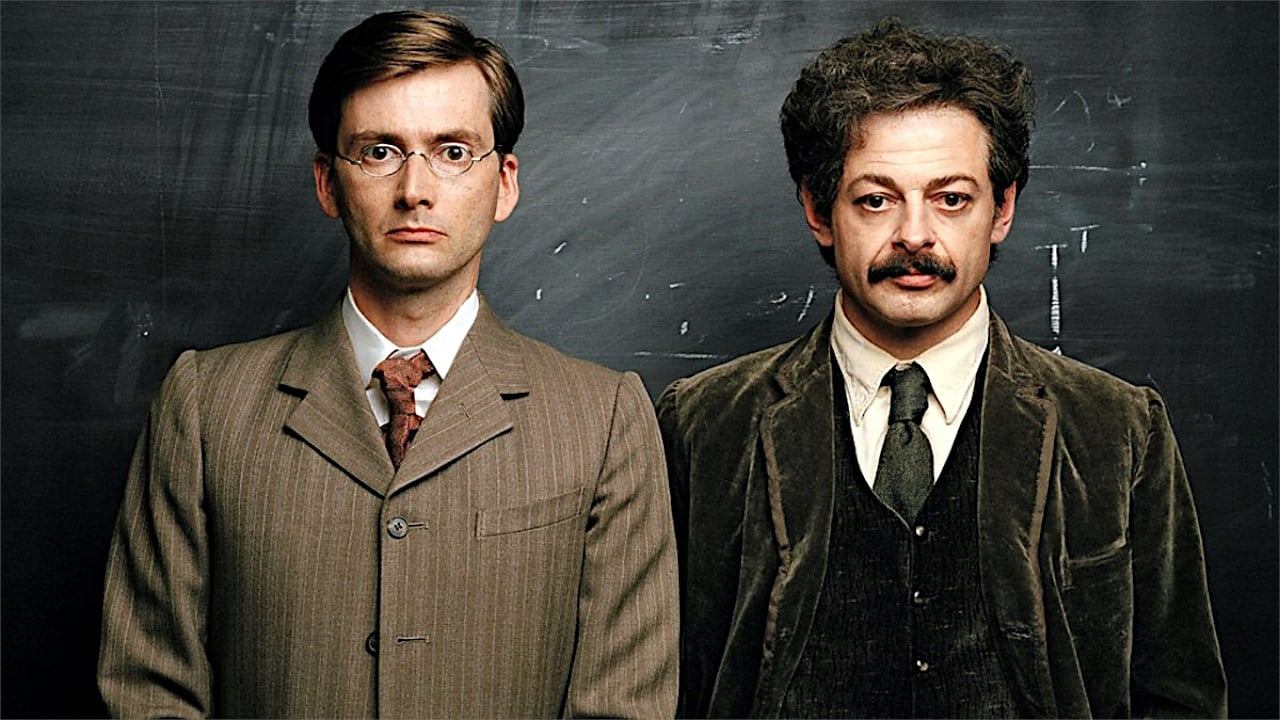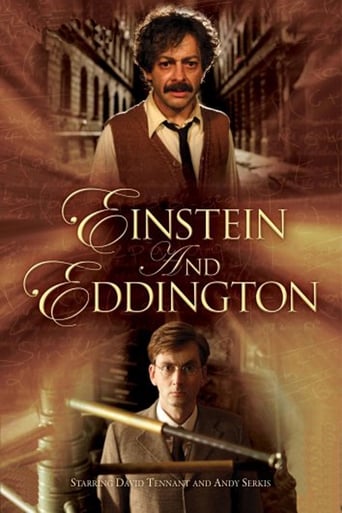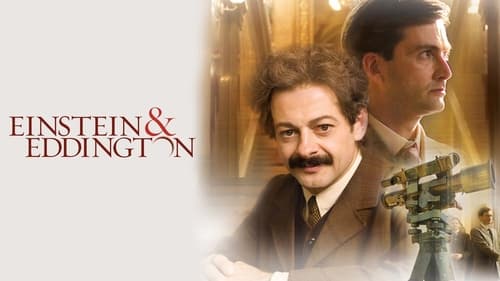


Although this is superficially an interesting, entertaining and well produced film with some good acting the writer, director and producer have unfortunately put drama before historical and scientific accuracy. The errors in this film are significant from both a historical and scientific perspective and it is a pity that the story of one of the greatest discoveries in scientific history, the results of which still reverberate around the world today, has been distorted and fabricated to make a drama. One wonders if the script was ever looked at by a professional scientific historian who actually knew what had happened or if the producers and director just accepted it as written. According to the credits Walter Isaacson, who wrote a biography of Einstein, is stated as a consultant. His 2007 biography of Einstein does not support the narrative structure of the film (made in 2008) and in particular does not describe the exchange of letters between Eddington and Einstein nor does it refer at all to the involvement of Sir Oliver Lodge. The key moments in the story and the various conflicts exposed could all have been based on actual events with the real people involved without compromising the drama. Unfortunately the writer invented situations that never happened, transposed individuals into roles they never had and simplified the announcement of the final discovery to the point of absurdity. Given the importance of this famous discovery to science and to the centenary of the event in 2019 one hopes the BBC do not resurrect it at that time as it is a complete travesty. I will list the errors below in the order in which they appear in the film. Some errors may be perceived as trivial and legitimate simplifications for dramatic purposes but other errors are much worse and significantly alter how this great discovery was made and how it was communicated. 1. The opening scene depicts the hauling of astronomical equipment up over rocks on Principe. This did not happen. The eclipse was photographed from the Rosa Sundy plantation which had road access from the port of Santo Antonio. 2. Eddington asks for papers by Einstein in the library and is handed one paper with the comment 'it's all there is'. The paper in question was published in Annalen der Physik in 1905 along with four other ground breaking papers by Einstein. The library would have had this very important journal plus many other papers by Einstein published in the decade up to 1915. 3. Possibly one of the most egregious inventions in the film is that Sir Oliver Lodge is given the leading role of criticising Einstein, supporting Newton and of apparently being the President of the Royal Astronomical Society. There is absolutely no evidence that Lodge was an astronomer or was involved with gravitation, Einstein or Eddington. He most certainly was not president of the Royal Astronomical Society and he did not appoint Eddington to run the Cambridge Observatory. His role in the film is entirely spurious and is presumably there because his son was famously killed at the first battle of Ypres allowing him to represent the antagonism against German science and the use of poison gas warfare by German scientists. To use an existing historical character like this who famously went on to become a spiritualist and President of the Society for Psychical Research is bizarre. 4. Eddington did not write to Einstein asking him to solve the problem of the anomalous orbit of Mercury. Einstein was already well aware of this problem and in fact solved it entirely on his own shortly before publishing his final theory in 1916. 5. In relation to point 4 Einstein did not collaborate with Planck on solving the Mercury problem. In fact Planck worked in an entirely different field from Einstein and had no involvement with his General Theory. Einstein was helped in the final formulation of his General Theory by David Hilbert. 6. Einstein did not write to Eddington with the solution to the Mercury problem. 7. Sir Oliver Lodge did not approve the granting of the money for the Principe expedition. 8. Eddington did not devise the eclipse experiment to test the bending of starlight. This had been suggested by Einstein years earlier and there had even been unsuccessful expeditions to test the prediction. 9. Dyson did not go to Principe with Eddington, it was Cottingham. 10. At Principe there were not six bad plates and two good ones. There were 16 plates taken during the eclipse; 9 showed nothing due to cloud and 7 plates showed up to 20 stars on which measurements could be made. 2 plates in particular provided very good images. 11. The plates were not first examined in public as depicted in the film. They had been meticulously measured for months previously along with other plates from Sobral in Brazil. The idea that Eddington looks at the plates for the first time in front of a large audience and declares a 'gap', thus vindicating Einstein, is absurd. Not only that there were two deflections up for consideration: a Newtonian one and an Einstein one twice as big. More could have been made of this in terms of the conflict between supporters of Newton and Einstein.
... View MoreThe central approach is quite good: Einstein v Newton during WW1. It's the perfect setting for yet another reminder of the British/German enmity that Hollywood loves to ram down our throats. According to the plot, Einstein is given a top Berlin academic post in order to embarrass the Britons by proving Newton wrong. Whilst in England Sir Arthur Eddington is given a senior Cambridge position just in order to prove the upstart German wrong.All the standard ingredients are there; nasty German scientists devoted to anti-personnel gas production, stiff old aristocrats interfering with progress and our two cool dudes strutting around their patches telling everyone what's what. But it's not just about giving the Krauts another bashing. Once again the Studios give us a spoon fed morality session with stereotypical bad guys looking like greasy bankers, sold out scientists and pompous officials waging senseless war for their own profit and power. (If only life was that clear cut) Meanwhile the good guys, Eddington and Einstein, are both above the mass killing. Their search for truth is a shining example of how the individual can change the world - or so Eddington tells us in a much edited final speech that could have been written by Thatcher.The sheer banality of the script is enough to bend space itself. Max Plank makes a stage entrance so contrived that even the Cleethorpes Junior School Drama Society would be embarrassed to stage it. We are treated to Einstein the improvised clown who leaps from boats explaining relativity to knee high children. Then he becomes a disheveled dropout who goes around demanding that the German authorities stop their gas campaign. Once again Hollywood takes 21st century man and sticks him into 19th.century society and once again it doesn't work. Our Einstein is so profoundly rude and abusive to the authorities that you know exactly which century he comes from.Of course David Tenant as Eddington is superb. Had he not been in the show I don't think I could have stuck it out and written this review. Watch this if you have a crush on him or an obsessive interest in Einstein. But don't expect to learn anything about 'Einstein the Man' in this movie for it was one of the worst pieces of casting and scripting that I've ever had the misfortune to endure.
... View MoreThere are not too many films which accurately depict the personal lives of historical figures. Try as they may, secret human peculiarities which are more readily acceptable or at least tolerated in our present age, are seen as huge obstacles in years past. Case in point, this film called " Einstein and Eddington " is only now surfacing to the American public and according to this reviewer, has done a masterful job. The story itself centers on two men of Genius who lived at the beginning of the Tweneith century. The first is Arthur Eddington (David Tennant) the British Mathematician and astrophysicist and German scientist Albert Einstein (Andy Serkis, superb characterization). This film captures both the social and a bit of their personal lives before they became known to the world. Einstein is seen searching for answers to his theories concerning gravitational phenomenon and it's relationship to light. Eddington is captivated by the scientific contradictions of the Planet Mercury and Newtons calculations of its orbit. The result is the communication between The Englishman and the Swiss scientist, both of whom shrug off their nationalities in lieu of scientific truth. With Eddington dealing with his personal emotional ties to his secret admiration and love for his dear friend William Marston, (Patrick Kennedy), Einstein, deals with his wife Malava who confronts him with divorce, due to his illicit affairs. Both men are seen in their moments of contentment as well as dealing with their doubts and tragedies. All in all, the movie is a great triumph for both actors and a notable milestone for their accomplishment. Easilly recommended to anyone who would like to peek into the personal lives of two men who shook the world. ****
... View MoreThis is a superb drama, combining a well-presented scientific and historical explication of Albert Einstein's theory of relativity alongside a gripping portrait of the moral dilemmas that scientists have to struggle with as they try to reconcile the demands of country and conscience.The twin leads British scientist Arthur Eddington (David Tennant) and Einstein (Andy Serkis) lead very different lives but face not only similar scientific opposition and derision but also similar pressures to back their country's efforts to win the First World War. Tennant shakes off the Dr Who expectations in pointing up the problems of a gay pacifist Quaker who tries to prove the new-fangled theories of 'enemy' scientist Einstein a theory especially dangerous because it undermines the ordered view of the universe created by English scientist Isaac Newton. Einstein's complicated private life is compounded by his revulsion at fellow scientists' work in developing poison gas. Both Tennant and Serkis get right into the skin of their characters - two brilliant actors on top form.The drama brings over very effectively the transition from the comfortable life of the scientists in pre-war Cambridge and Switzerland to the tragedies of war. Jim Broadbent as Sir Oliver Lodge and Donald Sumpter as Max Planck lead the scientific establishments in Cambridge and Berlin as they pervert their scientific beliefs to condone mass killing on a scale never before seen. The main female roles have rather less to do, but Rebecca Hall as Eddington's sister, Lucy Cohu as Einstein's abandoned wife and Jodhi May as his mistress all add an extra warmth to the production and help to avoid the danger of focusing only on clever men using symbols and formulae to bemuse their colleagues (and the audience).The settings Cambridge, Berlin and West Africa, where Eddington photographed a total eclipse of the sun to prove the Einstein's theory was right provide a powerful backdrop to the human drama, making it all the more believable. All in all, a very successful and informative BBC and HBO drama that maintains tension and excitement throughout.
... View More